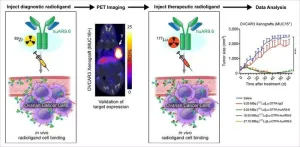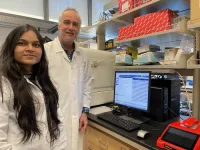(Press-News.org) Testing for tumour DNA in the blood can successfully identify advanced bladder cancer patients who will not relapse following surgery, new research shows.
This could allow doctors to target treatments more effectively to those who need it, and spare those patients for whom further treatment is unnecessary, researchers say.
The findings from the screening phase of the IMvigor011 Phase III trial are presented today [Friday 5 April] at the European Association of Urology Congress in Paris.
They show that just over 90% of muscle invasive bladder cancer (MIBC) patients with a negative circulating DNA (ctDNA) test following surgery, which remained negative on follow up, did not relapse. The findings mean that use of a ctDNA test could allow some patients to be spared further treatment with minimal risk.
MIBC is an advanced form of bladder cancer, where the tumour has spread into the bladder wall. The disease is usually treated by surgery to remove the bladder. Around half of patients see cancer return, often in the lungs and usually within two-to-three years. All patients are currently offered follow-up treatment such as chemotherapy or immunotherapy to prevent recurrence, for which the side effects can be serious and lifechanging.
Other Phase III trial results, also presented at the EAU Congress today, show that patients given immunotherapy, nivolumab, as a follow up to surgery have an average survival of nearly six years, compared to four for patients on placebo.
The CheckMate 274 trial has already shown that nivolumab can reduce recurrence of disease, but these interim results are the first to show the potential benefit in overall survival for MIBC patients.
Joost Boormans, Professor of Urology at Erasmus University Medical Centre in Rotterdam, and member of the EAU Scientific Congress Office, is chairing the session where both trials will present their findings. He said:
“Although we already knew that nivolumab improved disease-free survival in MIUC patients who received radical surgery, overall survival is what really matters following local treatment, such as radical surgery. These interim findings, which show that overall survival also improves, are very encouraging, particularly as this hasn’t been the case in other recent immunotherapy trials.
“The question for regulators and healthcare authorities is whether the improvement in overall survival is enough to justify licensing or prescribing the drug for all patients, in the knowledge that some of these patients would have been cured of their cancer by surgery alone. This is where the findings from the IMvigor011 trial could really make a difference, by allowing us to select patients at highest risk who will benefit the most from treatment while sparing others for whom it isn’t needed.
“At a time when healthcare resources are under pressure, this kind of innovation is really needed.”
IMvigor011
IMvigor011 is a global, double-blind, randomised Phase III trial looking at the efficacy of the immunotherapy atezolizumab vs placebo in patients with high-risk MIBC.
The trial is recruiting MIBC patients post-surgery and testing their blood for circulating tumour DNA. Those with a positive ctDNA result are randomised to receive either atezolizumab or placebo. Those with a negative result are given no further treatment, but were followed up with scans and further ctDNA tests for up to two years. For the analysis presented at the EAU Congress today, 171 patients with a negative ctDNA test were included, with follow up continuing on a further 115.
Just 17 patients of the 171 patients (9.9%) saw their cancer return within two years. These outcomes were irrespective of the stage their tumour was at or whether it showed elevated levels of PD-L1, a protein biomarker that plays a role in cancer.
Professor Thomas Powles of Barts Cancer Institute leads the IMvigor011 trial. He said: “These results are even better than we were hoping. The risk of relapse in this ctDNA group of patients is just 1 in 10. It appears this test can effectively filter patients into two groups: those who are likely to relapse and those at much lower risk. Focusing treatment on those at risk and sparing the very low risk group potentially life-altering treatment-related side effects is attractive. Hopefully these data will allow patients to remain treatment free with the reassurance they need, that they’re unlikely to see their cancer return.”
The study is sponsored by F. Hoffmann-La Roche Ltd.
CheckMate 274
CheckMate 274 is a global, Phase III, randomised, double-blind trial of nivolumab vs placebo in high-risk MIBC after surgery.
The trial recruited just over 700 patients, with half given nivolumab and the other half given a placebo every two weeks for 12 months following an operation to remove the bladder. Patients were also tested to see if their cancer had elevated levels of the biomarker PD-L1, which nivolumab specifically targets.
The trial has already reported positive results in preventing recurrence, particularly for PD-L1 patients. Across all patients, those on nivolumab had an average of 22 months before recurrence, compared to 10 months for those on placebo. However, of the PD-L1 group, those on nivolumab had an average of over four years without recurrence, compared to just over eight months for those on placebo.
The latest results, although still early stage, show a similar benefit in overall survival. For all patients, those on nivolumab survive on average for nearly six years (69.5 months) compared to just over four years (50.1 months) for those on placebo. The researchers do not yet have enough follow-up data to separate out the PD-L1 patients, but the analysis so far shows that overall survival is likely to also be even better for this group when treated with nivolumab versus placebo.
Professor Matthew Galsky from the Tisch Cancer Institute, Icahn School of Medicine at Mount Sinai in New York, leads the CheckMate 274 trial. He said: “We know that patients with high-risk urothelial cancer are at highest risk for recurrence within the first three years after surgery. We’ve now followed a substantial subset of patients for longer than that on this study without recurrence. It looks as if the improvement in disease free survival is ultimately going to translate into improvement in overall survival. And that’s for all patients, but particularly patients with the PD-L1 biomarker. Our hope is that this improvement will then translate into an increased likelihood of curing cancer in these patients.”
The trial is funded by Bristol Myers Squibb and Ono Pharmaceutical. Dr. Matthew D. Galsky is a paid consultant to Bristol Myers Squibb.
/ends
END
Bladder cancer treatment can be better targeted and more effective, trials show
Results of screening phase of IMvigor 011 and interim overall survival data from Checkmate 274
2024-04-05
ELSE PRESS RELEASES FROM THIS DATE:
Ocean floor a 'reservoir' of plastic pollution, world-first study finds
2024-04-05
New research from CSIRO, Australia’s national science agency, and the University of Toronto in Canada, estimates up to 11 million tonnes of plastic pollution is sitting on the ocean floor.
Every minute, a garbage truck’s worth of plastic enters the ocean. With plastic use expected to double by 2040, understanding how and where it travels is crucial to protecting marine ecosystems and wildlife.
Dr Denise Hardesty, Senior Research Scientist with CSIRO, said this is the first estimate of how much plastic waste ends up on the ocean floor, where it accumulates before being ...
Scientists discover potential treatment approaches for polycystic kidney disease
2024-04-04
Researchers have shown that dangerous cysts, which form over time in polycystic kidney disease (PKD), can be prevented by a single normal copy of a defective gene. This means the potential exists that scientists could one day tailor a gene therapy to treat the disease. They also discovered that a type of drug, known as a glycoside, can sidestep the effects of the defective gene in PKD. The discoveries could set the stage for new therapeutic approaches to treating PKD, which affects millions worldwide. The study, partially funded by the National Institutes of Health (NIH), is published in Cell Stem Cell.
Scientists ...
UTEP study: prairie voles display signs of human-like depression
2024-04-04
EL PASO, Texas (April 4, 2024) – Psychology researchers at The University of Texas at El Paso are making progress towards understanding the biological underpinnings of depression, a leading cause of disability that affects approximately 280 million people around the world.
In a study published this April in the Journal of Affective Disorders, UTEP psychologist Sergio Iñiguez, Ph.D., and his co-authors make the case that prairie voles, small rodents that are found throughout the central United States and Canada, can be effectively used as animal models to further the study of ...
Researchers envision sci-fi worlds involving changes to atmospheric water cycle
2024-04-04
Human activity is changing the way water flows between the Earth and atmosphere in complex ways and with likely long-lasting consequences that are hard to picture.
Land use change is altering where clouds form and how precipitation is distributed. Meanwhile, weather modification activities like cloud seeding are shifting how nations plan for water use in the face of climate change. These and other changes to the planet’s atmospheric water cycle were once hard to imagine but are increasingly part of modern water management on the planet.
Colorado State University Assistant Professor Patrick Keys is an expert ...
Novel theranostic tool allows for noninvasive identification and treatment of ovarian cancer
2024-04-04
Reston, VA—A new radiotheranostic system has the ability to detect and treat ovarian cancer noninvasively, according to new research published in the April issue of The Journal of Nuclear Medicine. Combining the highly specific huAR9.6 antibody with PET and therapeutic radionuclides, this theranostic platform may provide more personalized treatment to improve health outcomes for ovarian cancer patients.
Ovarian cancer causes more deaths than any other gynecologic malignancy, with a five-year survival rate below 30 percent for patients diagnosed at advanced stages. The current standard of care for ovarian cancer consists of surgery followed by platinum-based chemotherapy; however, ...
An NSF bootcamp for future scientists
2024-04-04
Research today doesn't only occur in a lab; indeed, many university researchers extend their work into the community with the goal of inspiring the next generation of scientists and engineers. And some government agencies, like the National Science Foundation, provide the funding to do so. Most recently, Xiayun Zhao, assistant professor of mechanical engineering & materials science at the University of Pittsburgh, completed such outreach at the Carnegie Science Center (CSC).
Zhao ...
Small protein plays big role in chronic HIV infection
2024-04-04
RIVERSIDE, Calif. -- NeuroHIV refers to the effects of HIV infection on the brain or central nervous system and, to some extent, the spinal cord and peripheral nervous system. A collection of diseases, including neuropathy and dementia, neuroHIV can cause problems with memory and thinking and compromise our ability to live a normal life.
Using a mouse model of neuroHIV, a research team led by biomedical scientists at the University of California, Riverside, studied the effects of interferon-β (IFNβ), a small protein involved in cell signaling and integral to the body’s natural defense mechanism against viral infections. The researchers found that higher or lower than ...
Perinatal women of Mexican descent propose solutions to pandemic-related stressors affecting Latinos
2024-04-04
CHAMPAIGN, Ill. — Public policies blocked many families of Mexican descent living in the U.S. from accessing vital services such as food and mental health care during the COVID-19 pandemic, even though these communities experienced some of the highest infection and mortality rates.
Thirty-eight perinatal women and mothers of young children were interviewed about the challenges they faced during the pandemic and proposed solutions to better meet the needs of their communities during future large-scale crises in a study led by University of Illinois Urbana-Champaign kinesiology and community health ...
Novel biological mechanism discovered that could lead to new treatments for neurological disorders, cancers
2024-04-04
The lab of Yongchao C. Ma, PhD, at Stanley Manne Children’s Research Institute at Ann & Robert H. Lurie Children’s Hospital of Chicago discovered a fundamental biological mechanism that could lead to new treatments for neurological diseases, such as spinal muscular atrophy (SMA) and autism, as well as different cancers. The study was published in the journal Human Molecular Genetics.
Dr. Ma’s team found that chemical modification of RNA (called RNA methylation) regulates mitochondrial ...
Stellar collisions produce strange, zombie-like survivors
2024-04-04
Despite their ancient ages, some stars orbiting the Milky Way’s central supermassive black hole appear deceptively youthful. But unlike humans, who might appear rejuvenated from a fresh round of collagen injections, these stars look young for a much darker reason.
They ate their neighbors.
This is just one of the more peculiar findings from new Northwestern University research. Using a new model, astrophysicists traced the violent journeys of 1,000 simulated stars orbiting our galaxy’s central supermassive black hole, Sagittarius A* (Sgr A*).
So densely packed with stars, the region commonly experiences brutal stellar collisions. ...
LAST 30 PRESS RELEASES:
Power in motion: transforming energy harvesting with gyroscopes
Ketamine high NOT related to treatment success for people with alcohol problems, study finds
1 in 6 Medicare beneficiaries depend on telehealth for key medical care
Maps can encourage home radon testing in the right settings
Exploring the link between hearing loss and cognitive decline
Machine learning tool can predict serious transplant complications months earlier
Prevalence of over-the-counter and prescription medication use in the US
US child mental health care need, unmet needs, and difficulty accessing services
Incidental rotator cuff abnormalities on magnetic resonance imaging
Sensing local fibers in pancreatic tumors, cancer cells ‘choose’ to either grow or tolerate treatment
Barriers to mental health care leave many children behind, new data cautions
Cancer and inflammation: immunologic interplay, translational advances, and clinical strategies
Bioactive polyphenolic compounds and in vitro anti-degenerative property-based pharmacological propensities of some promising germplasms of Amaranthus hypochondriacus L.
AI-powered companionship: PolyU interfaculty scholar harnesses music and empathetic speech in robots to combat loneliness
Antarctica sits above Earth’s strongest “gravity hole.” Now we know how it got that way
Haircare products made with botanicals protects strands, adds shine
Enhanced pulmonary nodule detection and classification using artificial intelligence on LIDC-IDRI data
Using NBA, study finds that pay differences among top performers can erode cooperation
Korea University, Stanford University, and IESGA launch Water Sustainability Index to combat ESG greenwashing
Molecular glue discovery: large scale instead of lucky strike
Insulin resistance predictor highlights cancer connection
Explaining next-generation solar cells
Slippery ions create a smoother path to blue energy
Magnetic resonance imaging opens the door to better treatments for underdiagnosed atypical Parkinsonisms
National poll finds gaps in community preparedness for teen cardiac emergencies
One strategy to block both drug-resistant bacteria and influenza: new broad-spectrum infection prevention approach validated
Survey: 3 in 4 skip physical therapy homework, stunting progress
College students who spend hours on social media are more likely to be lonely – national US study
Evidence behind intermittent fasting for weight loss fails to match hype
How AI tools like DeepSeek are transforming emotional and mental health care of Chinese youth
[Press-News.org] Bladder cancer treatment can be better targeted and more effective, trials showResults of screening phase of IMvigor 011 and interim overall survival data from Checkmate 274







